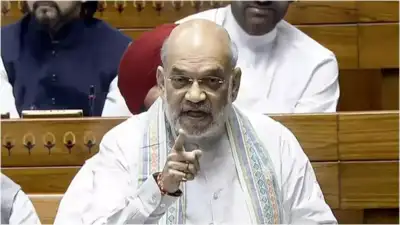Controversial | Amit Shah Bill 2025: Leaders Must Step Down After 30 Days in Jail

New Delhi | Azad Reporter Desk – The Amit Shah Bill 2025 has triggered a major political storm in India. On Wednesday, Union Home Minister Amit Shah introduced three new bills in the Lok Sabha, one of which makes it mandatory for any Prime Minister, Chief Minister, or minister to step down if they spend more than 30 consecutive days in jail.
Table of Contents

This proposed law is being hailed by the ruling party as a historic reform to strengthen democracy and accountability. However, the opposition parties have strongly objected to the bill, calling it unconstitutional and politically motivated.
The ruling party is praising this new law as a significant reform to enhance democracy and accountability. In contrast, opposition parties are vehemently opposing the bill, labeling it as unconstitutional and politically driven.
Why Was the Amit Shah Bill 2025 Introduced?
The government argued that the bill was necessary because in recent years, several high-profile leaders continued to remain in office despite being in jail.
- Delhi Chief Minister Arvind Kejriwal stayed in office for nearly six months while in custody.
- Tamil Nadu Minister V. Senthil Balaji continued as minister for 241 days even while imprisoned.
The lack of clear legal provisions created political controversies and confusion. According to Amit Shah, the new law would “fill this gap” and ensure that leaders facing serious criminal charges cannot misuse their positions of power while being behind bars.
Why This Law Was Needed?
The government pointed to recent high-profile cases to justify the law.
- Arvind Kejriwal, Delhi Chief Minister, continued as CM even after his arrest and resigned only after almost six months in jail.
- V. Senthil Balaji, Tamil Nadu minister, remained in office for 241 days despite being behind bars.
The Centre argued that such situations arose because existing laws only required ministers to resign if convicted by a court. There was no clear provision regarding arrest and prolonged imprisonment.
Opposition Reaction
The bill sparked uproar in Parliament. The Congress, AIMIM, and Samajwadi Party strongly opposed it. AIMIM leader Asaduddin Owaisi went as far as calling it “against the Constitution and judicial process.”
Opposition MPs accused the government of trying to target political rivals through selective arrests. They argued that until a person is convicted, forcing them to resign just on the basis of being in custody could be an abuse of power.
Amid the heated debate, Amit Shah recommended that the bill be referred to a Joint Parliamentary Committee (JPC) for further discussion.
Other Bills Tabled Alongside
Apart from the Amit Shah Bill 2025, the government also presented a bill to regulate online money gaming. This bill proposes:
- Up to three years of imprisonment for violators
- Fines of up to ₹1 crore for companies involved in illegal gaming
The government claims that this step will protect youth from gambling addiction and ensure responsible digital gaming practices in India.
Impact on Indian Politics | Amit Shah Bill 2025
If passed, the Amit Shah Bill 2025 would mark a turning point in Indian politics. For the first time, a law would require ministers and chief executives of states to give up their posts if they remain in custody for 30 days or more.
Supporters say it will bring much-needed transparency and restore public trust in governance. Critics, however, warn that it may be misused to settle political scores.
Conclusion
The Amit Shah Bill 2025 has become one of the most talked-about topics in Indian politics. With strong arguments from both sides, the final shape of the law will depend on detailed discussions in the JPC and future parliamentary sessions. Whether it emerges as a historic reform or a controversial move remains to be seen.
What is the Amit Shah Bill 2025?
The Amit Shah Bill 2025 is a proposed legislation introduced by Union Home Minister Amit Shah, focusing on tightening rules and accountability for elected representatives, including Prime Minister, Chief Ministers, and ministers.
Why is the Amit Shah Bill 2025 being debated?
The bill is being debated because it brings major political and legal reforms, sparking both support and criticism. Right-wing groups see it as a strong step toward transparency and governance.
What are the positive reactions to the Amit Shah Bill 2025?
Right-wing supporters welcome the bill, praising it as a powerful move to ensure honesty, strengthen democracy, and curb misuse of political power.
Who will be most affected by the Amit Shah Bill 2025?
The bill primarily affects elected representatives—Prime Minister, Chief Ministers, ministers, and lawmakers—by introducing stricter accountability rules.
How will the Amit Shah Bill 2025 impact Indian politics?
If passed, the bill could reshape Indian politics by enforcing stronger ethical standards, increasing public trust, and setting new benchmarks for political conduct.



